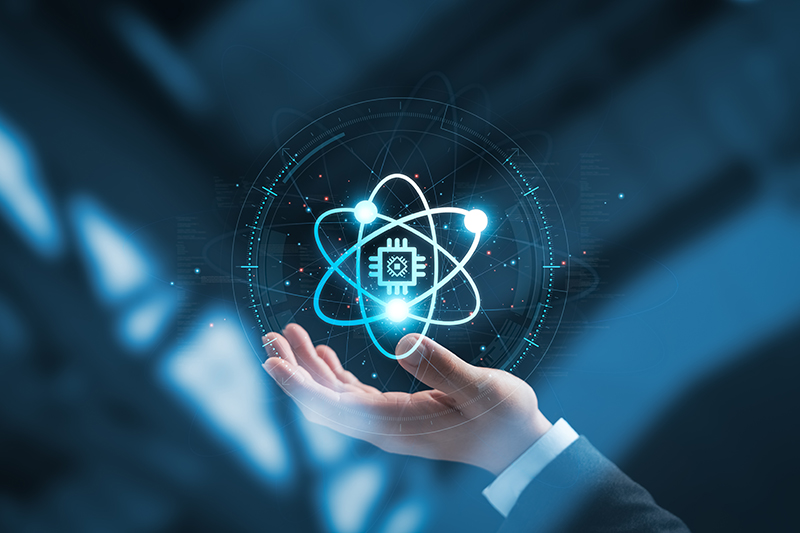The Y2K crisis of 1999-2000 demonstrated how technological dependencies can create widespread concern about system failures. Today, cybersecurity experts are monitoring a potentially more significant challenge: Y2Q, or “Years to Quantum”—the period leading up to when quantum computers will be capable of breaking current encryption methods.
Understanding the Y2Q Challenge
Current cybersecurity relies on mathematical encryption that would require classical computers an impractically long time to break—potentially longer than the age of the universe. These encryption methods protect passwords, financial transactions, and private communications across all digital systems.
Quantum computers represent a fundamental shift in computing capability that could potentially render these protections obsolete. The Cloud Security Alliance has identified April 14, 2030, as a target date for Y2Q, though quantum computing timelines remain inherently uncertain.
A concerning development is that cybercriminals are already collecting encrypted data, anticipating they will eventually possess the quantum computing power necessary to decrypt it. This “harvest now, decrypt later” approach means that data considered secure today may be vulnerable retroactively once quantum computers mature.
Educational System Implications
The timing of Y2Q has significant implications for educational institutions. Students entering kindergarten today will graduate high school around 2037, well into the projected post-quantum era. These students are developing within educational systems that increasingly rely on digital infrastructure for assignments, grade management, and college applications.
If quantum computing disrupts these digital systems, educational institutions with maintained analog backup systems may find themselves better positioned to continue operations. Schools that have preserved physical records, traditional libraries, and hands-on learning environments could demonstrate greater resilience during the transition period.
This situation suggests educational institutions should consider developing dual-track approaches that prepare students for both digital proficiency and analog competencies. Skills such as physical research methods, manual calculation techniques, and in-person collaboration may prove as valuable as technological literacy.
Quantum Computing Development Progress
Google’s quantum computing development illustrates the rapid advancement in this field. From their Foxtail processor in 2017 to the recent Willow chip in December 2024, each iteration has demonstrated significant improvements. Willow features twice the qubits of its predecessor Sycamore and achieves five times better coherence time, representing substantial progress toward practical quantum computing applications.
However, current quantum computers, including Willow, cannot yet break real-world encryption systems. The technology remains in development, but the trajectory suggests practical quantum computing capabilities are approaching.
Post-Quantum Cryptography Response
The cybersecurity industry has responded to the quantum threat by developing post-quantum cryptography—mathematical algorithms designed to resist quantum computer attacks. This approach involves creating computational problems that remain difficult even for quantum systems to solve.
This strategy faces inherent limitations: it requires predicting the capabilities of fully-developed quantum computers that do not yet exist, using mathematical assumptions about quantum-resistant problems, against attack methods that have not been fully tested.
Additionally, post-quantum algorithms typically require larger key sizes and greater computational resources, potentially impacting system performance and user experience compared to current encryption methods.
Implications of Widespread Digital System Vulnerability
If quantum computers develop faster than quantum-resistant alternatives can be deployed, or if post-quantum cryptography proves inadequate, society may face a period where digital systems cannot be trusted for secure communications or transactions.
This scenario could necessitate a return to analog methods for sensitive operations. Physical documentation, cash transactions, and in-person meetings might become preferred options for secure communications and business operations.
Such a shift would represent a significant departure from current digital dependencies and could require substantial adjustments across all sectors of society.
Educational Adaptation Strategies
Educational institutions could benefit from preparing for this potential analog renaissance by teaching students to operate effectively in both digital and non-digital environments. This might include traditional research methods using physical resources, manual calculation skills, and direct observation techniques in scientific studies.
Rather than rejecting technology, this approach emphasizes building resilience through versatility. Students who can function effectively with or without digital tools would be better prepared for uncertain technological conditions.
Institutionally, schools heavily dependent on cloud-based systems for core operations may face disruptions during quantum transitions. Educational institutions that maintain hybrid systems combining digital efficiency with analog reliability could continue operations more smoothly during transition periods.
Community-Scale Implications
Y2Q may inadvertently strengthen smaller, community-based organizations that operate effectively without extensive digital infrastructure. Local markets, community workshops, and neighborhood organizations that rely primarily on direct human interaction and physical systems may prove more resilient during
digital disruptions.
For students preparing for future careers, the ability to build and maintain real-world community connections may become as valuable as technical skills. Competencies in event organization, consensus building, and collaborative problem-solving without digital mediation could prepare students for leadership roles in post-quantum society.
Global Economic Considerations
Regions with lower digital dependency may possess advantages during the quantum transition. Countries and communities that continue to rely heavily on cash transactions, physical record-keeping, and in-person business relationships would require less dramatic adaptation.
This could represent a significant shift in global competitive advantages, with less digitally dependent regions potentially demonstrating greater stability during the transition period.
For educators, this suggests the importance of technological flexibility rather than solely digital literacy—helping students develop the capacity to use digital tools effectively while maintaining the ability to function without them.
Economic Disruption Potential
Y2Q could trigger significant wealth redistribution if digital assets lose value while physical assets gain importance. Traditional commodities, real estate, and precious metals might increase in value relative to digital holdings.
Similarly, the knowledge economy could experience disruption, with expertise in digital systems potentially losing value while traditional crafts, local knowledge, and community leadership skills become more valuable.
Students planning future careers might benefit from developing diverse skill sets that combine both technological and traditional competencies.
Preparation Strategies
Individual and institutional preparation for Y2Q extends beyond conventional cybersecurity measures. This might include maintaining physical records of important information, teaching both digital and analog skills, and building local community networks that do not depend entirely on digital infrastructure.
Preparation could involve encouraging students to learn traditional skills alongside modern ones, supporting local businesses and supply chains, and helping young people develop mental flexibility for adapting to unreliable systems they have grown up depending upon.
Most importantly, preparation involves helping students understand that digital systems they consider permanent and reliable may not remain so indefinitely.
Long-term Societal Implications
Y2Q represents more than a cybersecurity challenge—it may constitute a significant societal transition point that could reshape how human communities organize themselves. For educators and parents, this creates both challenges and opportunities.
The challenge involves preparing young people for a world where digital dependence might become problematic rather than advantageous. The opportunity lies in helping them develop flexibility, community connections, and diverse skills that will serve them well regardless of technological disruptions.
Whether this transition occurs smoothly or chaotically may depend on how seriously society addresses the possibility that digital dependencies may not be as permanent as commonly assumed. While quantum computers capable of breaking current encryption remain years away from practical deployment, the educational and social structures needed to function during and after that transition require preparation that must begin now.
The question extends beyond whether better encryption can be developed to whether the next generation can be prepared for more resilient forms of human organization. Y2Q may compel society to rediscover that the most robust human systems often operate at human scale, built on direct relationships, local knowledge, and community resilience rather than technological complexity.
References
Cloud Security Alliance. (2022, March 9). Cloud security alliance sets countdown clock to quantum [Press release]. Business Wire. https://www.businesswire.com/news/home/20220309005135/en/Cloud-Security-Alliance-Sets-Countdown-Clock-to-Quantum
Cybersecurity Ventures. (2024, November 18). Y2Q will be here sooner than you think. https://cybersecurityventures.com/quantropi-on-y2q/
Google Quantum AI. (2024, December 9). Meet Willow, our state-of-the-art quantum chip. Google Blog. https://blog.google/technology/research/google-willow-quantum-chip/
HPCwire. (2024, December 9). Google debuts new quantum chip, error correction breakthrough, and roadmap details. https://www.hpcwire.com/2024/12/09/google-debuts-new-quantum-chip-error-correction-breakthrough-and-roadmap-details/
InfoQ. (2024, December 21). Google Willow sets new quantum supremacy milestone. https://www.infoq.com/news/2024/12/google-willow-quantum-supremacy/
Munoz, C. (2024, December 17). Unpacking the significance of Google’s quantum chip breakthrough. Syracuse University News. https://news.syr.edu/blog/2024/12/17/unpacking-the-significance-of-googles-quantum-chip-breakthrough/
National Public Radio. (2024, December 12). Google unveils a quantum chip. Could it help unlock the universe’s deepest secrets? https://www.npr.org/2024/12/11/nx-s1-5223486/google-new-chip-quantum-computing
Quantropi. (2025, July 8). Y2Q and the quantum threat are coming sooner than you think. https://www.quantropi.com/why-y2q-and-the-quantum-threat-are-coming-much-sooner-than-you-think/
Quantum Computing Report. (2023, May 10). Cloud Security Alliance creates a countdown to Y2Q clock.
https://quantumcomputingreport.com/cloud-security-alliance-creates-a-countdown-to-y2q-clock/
The Quantum Insider. (2024, December 9). Google Quantum AI: New quantum chip outperforms classical computers and breaks error correction threshold. https://thequantuminsider.com/2024/12/09/google-quantum-ai-new-quantum-chip-outperforms-classical-computers-and-breaks-error-correction-threshold/
R&D World Online. (2024, December 11). Willow chip sets 2.4x quantum memory record. R&D World. https://www.rdworldonline.com/willow-quantum-memory-breakthrough-google/
Syracuse University News. (2024, December 17). Unpacking the significance of Google’s quantum chip breakthrough. Syracuse University News. https://news.syr.edu/blog/2024/12/17/unpacking-the-significance-of-googles-quantum-chip-breakthrough/
ABOUT THE AUTHORS:
Dr. Truman Spring bridges innovation and educational transformation across Western Canada. As a senior K-12 administrator in special education and university director of Leadership and Continuing Education, he has championed adaptive approaches to institutional change. His entrepreneurial ventures in emerging technologies across diverse sectors inform his leadership philosophy in both education and public service. Dr. Spring chaired three BC Attorney General task forces on exploited children, serves on community development boards, and is a dissertation committee member at City University of Seattle, where he guides doctoral research at the intersection of innovation and educational equity.
Dr. Heather Henderson is an educational leader who has served in a variety of educational leadership positions from teacher to school and district-based administrator in three Canadian provinces: British Columbia, Alberta, and Saskatchewan.
For the last fourteen years, Dr. Henderson has worked with City University of Seattle as both the Canadian Director of the Educational (M Ed) Leadership program as well as serving as a Dissertation Faculty member in her support of doctoral students for City University. As well, Dr. Henderson is often contracted as a Foreign Examiner for several international universities as they support their PhD students.




